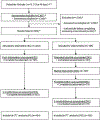Web intervention for OEF/OIF veterans with problem drinking and PTSD symptoms: a randomized clinical trial
- PMID: 23875821
- PMCID: PMC9169869
- DOI: 10.1037/a0033697
Web intervention for OEF/OIF veterans with problem drinking and PTSD symptoms: a randomized clinical trial
Abstract
Objective: Veterans who served in Operation Enduring Freedom (OEF) and Operation Iraqi Freedom (OIF) commonly experience alcohol misuse and symptoms of posttraumatic stress disorder (PTSD) following their return from deployment to a war zone. We conducted a randomized clinical trial to evaluate the efficacy of a newly developed, 8-module, self-management web intervention (VetChange) based on motivational and cognitive-behavioral principles to reduce alcohol consumption, alcohol-related problems, and PTSD symptoms in returning combat veterans.
Method: Six hundred participants, recruited through targeted Facebook ads, were randomized to either an Initial Intervention Group (IIG; n = 404) or a Delayed Intervention Group (DIG; n = 196) that waited 8 weeks for access to VetChange. Primary outcome measures were Drinks per Drinking Day, Average Weekly Drinks, Percent Heavy Drinking Days, and PTSD symptoms. Intent-to-treat analyses compared changes in outcome measures over time between IIG and DIG as well as within-group changes.
Results: IIG participants demonstrated greater reductions in drinking (p < .001 for each measure) and PTSD symptoms (p = .009) between baseline and end-of-intervention than did DIG participants between baseline and the end of the waiting period. DIG participants showed similar improvements to those in IIG following participation in VetChange. Alcohol problems were also reduced within each group between baseline and 3-month follow-up.
Conclusions: Results indicate that VetChange is effective in reducing drinking and PTSD symptoms in OIF/OEF veterans. Further studies of VetChange are needed to assess web-based recruitment and retention methods and to determine VetChange's effectiveness in demographic and clinical sub-populations of returning veterans.
(c) 2013 APA, all rights reserved.
Figures


References
-
- Babor TF, de la Fuente JR, Saunders J, & Grant M (1992). AUDIT: The Alcohol Use Disorders Identification Test: Guidelines for Use in Primary Care Health. Geneva, Switzerland: World Health Organization.
-
- Bennett GG & Glasgow RE (2009). The Delivery of Public Health Interventions via the Internet: Actualizing Their Potential. Annual Review of Public Health, 30, 273–292. - PubMed
Publication types
MeSH terms
Grants and funding
LinkOut - more resources
Full Text Sources
Other Literature Sources
Medical

